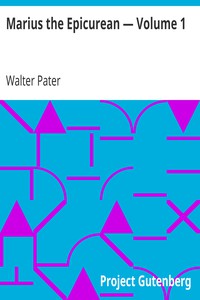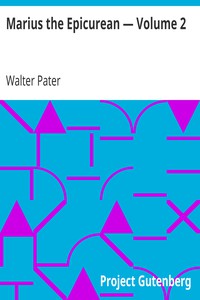Marius the Epicurean — Volume 1, Walter Pater [digital ebook reader .TXT] 📗

- Author: Walter Pater
Book online «Marius the Epicurean — Volume 1, Walter Pater [digital ebook reader .TXT] 📗». Author Walter Pater
And a certain vague fear of evil, constitutional in him, enhanced still further this sentiment of home as a place of tried security. His religion, that old Italian religion, in contrast with the really light-hearted religion of Greece, had its deep undercurrent of gloom, its sad, haunting imageries, not exclusively confined to the walls of Etruscan tombs. The function of the conscience, not always as the prompter of gratitude for benefits received, but oftenest as his accuser before those angry heavenly masters, had a large part in it; and the sense of some unexplored evil, ever dogging his footsteps, made him oddly suspicious of particular places and persons. Though his liking for animals was so strong, yet one fierce day in early summer, as he walked along a narrow road, he had seen the snakes breeding, and ever afterwards avoided that place and its ugly associations, for there was something in the incident which made food distasteful and his sleep uneasy for many days afterwards. The memory of it however had almost passed away, when at the corner of a street in Pisa, he came upon an African showman exhibiting a great serpent: once more, as the reptile writhed, the former painful impression revived: it was like a peep into the lower side of the real world, and again for many days took all sweetness from food and sleep. He wondered at himself indeed, trying to puzzle out the secret of that repugnance, having no particular dread of a snake’s bite, like one of his companions, who had put his hand into the mouth of an old garden-god and roused there a sluggish viper. A kind of pity even mingled with his aversion, and he could hardly have killed or injured the animals, which seemed already to suffer by the very circumstance of their life, being what they were. It was something like a fear of the supernatural, or perhaps rather a moral feeling, for the face of a great serpent, with no grace of fur or feathers, so different from quadruped or bird, has a sort of humanity of aspect in its spotted and clouded nakedness. There was a humanity, dusty and sordid and as if far gone in corruption, in the sluggish coil, as it awoke suddenly into one metallic spring of pure enmity against him. Long afterwards, when it happened that at Rome he saw, a second time, a showman with his serpents, he remembered the night which had then followed, thinking, in Saint Augustine’s vein, on the real greatness of those little troubles of children, of which older people make light; but with a sudden gratitude also, as he reflected how richly possessed his life had actually been by beautiful aspects and imageries, seeing how greatly what was repugnant to the eye disturbed his peace.
Thus the boyhood of Marius passed; on the whole, more given to contemplation than to action. Less prosperous in fortune than at an earlier day there had been reason to expect, and animating his solitude, as he read eagerly and intelligently, with the traditions of the past, already he lived much in the realm of the imagination, and became betimes, as he was to continue all through life, something of an idealist, constructing the world for himself in great measure from within, by the exercise of meditative power. A vein of subjective philosophy, with the individual for its standard of all things, there would be always in his intellectual scheme of the world and of conduct, with a certain incapacity wholly to accept other men’s valuations. And the generation of this peculiar element in his temper he could trace up to the days when his life had been so like the reading of a romance to him. Had the Romans a word for unworldly? The beautiful word umbratilis perhaps comes nearest to it; and, with that precise sense, might describe the spirit in which he prepared himself for the sacerdotal function hereditary in his family—the sort of mystic enjoyment he had in the abstinence, the strenuous self-control and ascêsis, which such preparation involved. Like the young Ion in the beautiful opening of the play of Euripides, who every morning sweeps the temple floor with such a fund of cheerfulness in his service, he was apt to be happy in sacred places, with a susceptibility to their peculiar influences which he never outgrew; so that often in after-times, quite unexpectedly, this feeling would revive in him with undiminished freshness. That first, early, boyish ideal of priesthood, the sense of dedication, survived through all the distractions of the world, and when all thought of such vocation had finally passed from him, as a ministry, in spirit at least, towards a sort of hieratic beauty and order in the conduct of life.
And now what relieved in part this over-tension of soul was the lad’s pleasure in the country and the open air; above all, the ramble to the coast, over the marsh with its dwarf roses and wild lavender, and delightful signs, one after another—the abandoned boat, the ruined flood-gates, the flock of wild birds—that one was approaching the sea; the long summer-day of idleness among its vague scents and sounds. And it was characteristic of him that he relished especially the grave, subdued, northern notes in all that—the charm of the French or English notes, as we might term them—in the luxuriant Italian landscape.
CHANGE OF AIR
Dilexi decorem domus tuae.
That almost morbid religious idealism, and his healthful love of the country, were both alike developed by the circumstances of a journey, which happened about this time, when Marius was taken to a certain temple of Aesculapius, among the hills of Etruria, as was then usual in such cases, for the cure of some boyish sickness. The religion of Aesculapius, though borrowed from Greece, had been naturalised in Rome in the old republican times; but had reached under the Antonines the height of its popularity throughout the Roman world. That was an age of valetudinarians, in many instances of imaginary ones; but below its various crazes concerning health and disease, largely multiplied a few years after the time of which I am speaking by the miseries of a great pestilence, lay a valuable, because partly practicable, belief that all the maladies of the soul might be reached through the subtle gateways of the body.
Salus, salvation, for the Romans, had come to mean bodily sanity. The religion of the god of bodily health, Salvator, as they called him absolutely, had a chance just then of becoming the one religion; that mild and philanthropic son of Apollo surviving, or absorbing, all other pagan godhead. The apparatus of the medical art, the salutary mineral or herb, diet or abstinence, and all the varieties of the bath, came to have a kind of sacramental character, so deep was the feeling, in more serious minds, of a moral or spiritual profit in physical health, beyond the obvious bodily advantages one had of it; the body becoming truly, in that case, but a quiet handmaid of the soul. The priesthood or “family” of Aesculapius, a vast college, believed to be in possession of certain precious medical secrets, came nearest perhaps, of all the institutions of the pagan world, to the Christian priesthood; the temples of the god, rich in some instances with the accumulated thank-offerings of centuries of a tasteful devotion, being really also a kind of hospitals for the sick, administered in a full conviction of the religiousness, the refined and sacred happiness, of a life spent in the relieving of pain.
Elements of a really experimental and progressive knowledge there were doubtless amid this devout enthusiasm, bent so faithfully on the reception of health as a direct gift from God; but for the most part his care was held to take effect through a machinery easily capable of misuse for purposes of religious fraud. Through dreams, above all, inspired by Aesculapius himself, information as to the cause and cure of a malady was supposed to come to the sufferer, in a belief based on the truth that dreams do sometimes, for those who watch them carefully, give many hints concerning the conditions of the body—those latent weak points at which disease or death may most easily break into it. In the time of Marcus Aurelius these medical dreams had become more than ever a fashionable caprice. Aristeides, the “Orator,” a man of undoubted intellectual power, has devoted six discourses to their interpretation; the really scientific Galen has recorded how beneficently they had intervened in his own case, at certain turning-points of life; and a belief in them was one of the frailties of the wise emperor himself. Partly for the sake of these dreams, living ministers of the god, more likely to come to one in his actual dwelling-place than elsewhere, it was almost a necessity that the patient should sleep one or more nights within the precincts of a temple consecrated to his service, during which time he must observe certain rules prescribed by the priests.
For this purpose, after devoutly saluting the Lares, as was customary before starting on a journey, Marius set forth one summer morning on his way to the famous temple which lay among the hills beyond the valley of the Arnus. It was his greatest adventure hitherto; and he had much pleasure in all its details, in spite of his feverishness. Starting early, under the guidance of an old serving-man who drove the mules, with his wife who took all that was needful for their refreshment on the way and for the offering at the shrine, they went, under the genial heat, halting now and then to pluck certain flowers seen for the first time on these high places, upwards, through a long day of sunshine, while cliffs and woods sank gradually below their path. The evening came as they passed along a steep white road with many windings among the pines, and it was night when they reached the temple, the lights of which shone out upon them pausing before the gates of the sacred enclosure, while Marius became alive to a singular purity in the air. A rippling of water about the place was the only thing audible, as they waited till two priestly figures, speaking Greek to





Comments (0)